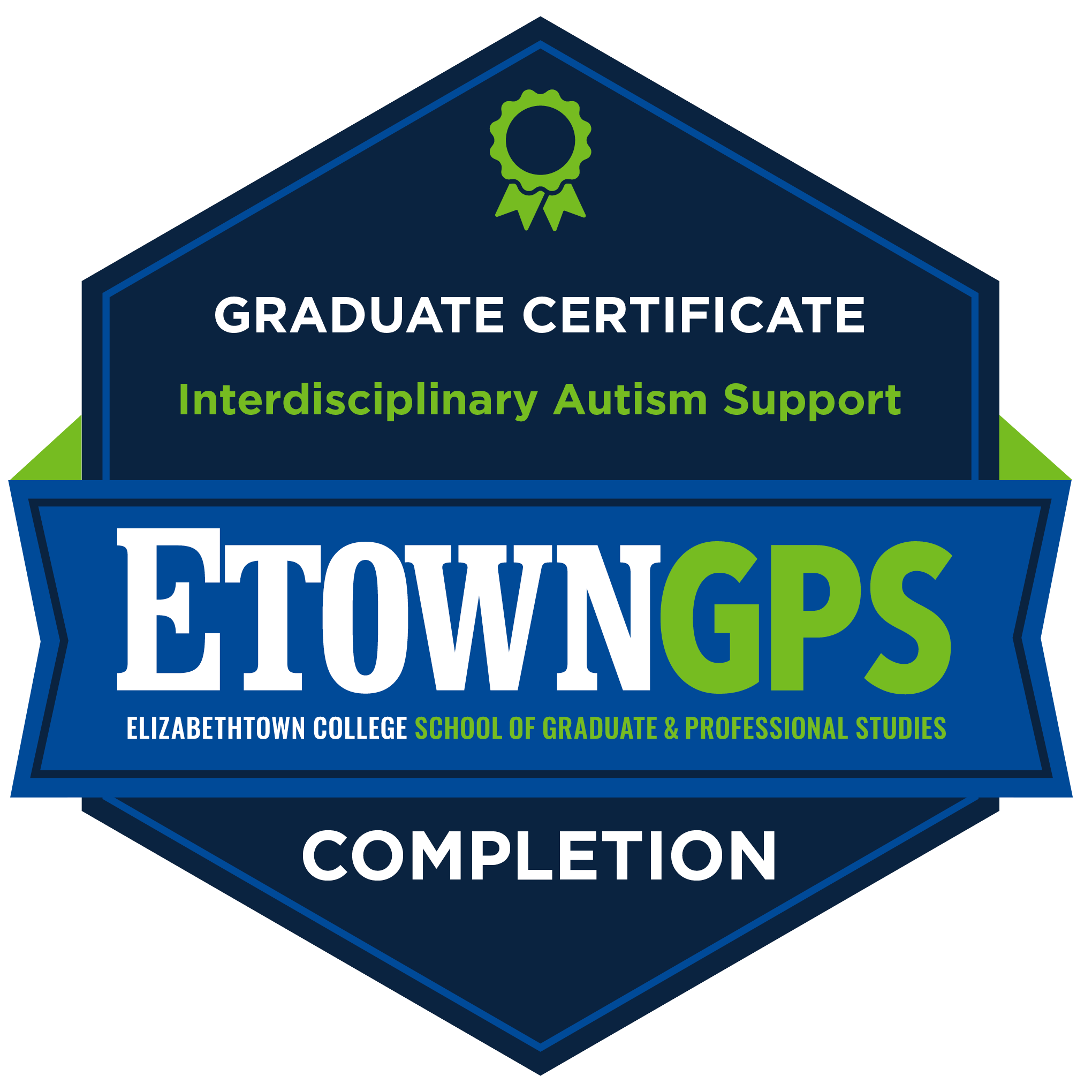Why Earn a Graduate Certificate in Interdisciplinary Autism Support with Etown?
The Graduate Certificate in Interdisciplinary Autism Support at Elizabethtown College is an excellent choice for professionals in various fields like occupational therapy, education, and healthcare. This certificate program provides specialized training to meet the increasing needs of individuals with Autism, equipping you with advanced skills and knowledge for real-world problem-solving. The program's focus on evidence-based practices and interventions makes it an invaluable resource for those dedicated to enhancing the lives of individuals with autism across different environments and stages of life.
In addition, this certificate can be completed in less than a year and all credits can be stacked into Etown's M.Ed. in Curriculum and Instruction as well as the Doctorate of Occupational Therapy, providing a clear path to further education.
Program Outcomes:
- Appreciate, understand the complexity, and compare autism strengths and challenges across the lifespan, from diagnosis through adulthood.
- Implement evidence-based interoception assessments and interventions to improve sleep, eating, toileting, education, emotional regulation and social participation individually and in group settings.
- Use evidence-based lifestyle (focus on food choice) assessment and interventions to improve sleep, eating, toileting, emotional regulation and social participation individually and in group settings.
- Design and create programs and environments that support individuals with autism in their homes, schools, at work and communities.
Expand Your Expertise in Autism Support
The Interdisciplinary Autism Support Certificate from Elizabethtown College prepares you for high-demand roles in fields like occupational therapy, teaching, and other health and human services. With the growing need for expertise in autism diagnosis, treatment, care, and applied behavioral analysis, this certification opens doors to numerous career opportunities. These roles are not only in demand but are also expected to see significant growth, making this certificate a valuable asset for professionals seeking to specialize and advance in their careers.
Also setting this program apart is the fact the credits earned can be stacked into Etown's M.Ed. in Curriculum and Instruction, as well as the Doctorate of Occupational Therapy program for a streamlined pathway for educational advancement.
Understand Tuition Costs and Explore Scholarship Opportunities
SGPS Holiday Discount
Apply by Dec. 31 to receive 20% off your first Etown SGPS spring course beginning Jan. 12, 2026!
Apply Today
X
SGPS Holiday Discount
Apply by Dec. 31 to receive 20% off your first Etown SGPS spring course beginning Jan. 12, 2026!
Apply TodayX
The Graduate Certificate in Interdisciplinary Autism Support is priced at $525 per credit. Scholarships and financial aid are available to make your Etown SGPS education even more affordable. Below are just a few of the scholarships and programs available to students:
- Alumni Scholarship: 15% tuition discount, available to Elizabethtown College alumni.
- Affinity Partner Scholarship: 15% discount, offered to employees of organizations partnered with Etown SGPS.
- Jay Fellowship Referral Program: This is a referral program that benefits both current students/alumni and prospective students. When a student or alum refers a new student, both the referrer and the referred student receive a complimentary credit for their program of interest.
- Additional Scholarships for Adult Learners: Discover scholarship opportunities designed to support adult learners in achieving their academic goals. View more information on Scholarships for Adult Learners.
Tuition and fees are reviewed and subject to change annually.
Tuition & AidOnline Graduate Certificate in Interdisciplinary Autism Support
The Graduate Certificate in Interdisciplinary Autism Support from Elizabethtown College requires 12 credit hours of academic work. Students must take at least 9 credits through Elizabethtown College to be awarded the graduate certificate.
Showcase Your Achievement
Upon completing the program, you’ll receive a digital Credly badge — a verified credential that recognizes your accomplishment. Credly will email you with instructions on how to accept and share your badge. You can easily add it to your LinkedIn profile, resume, or any platform where you want to highlight your achievements.
For questions, contact the School of Graduate and Professional Studies.

Application Requirements & Process
To be eligible to apply to any of our graduate certificate programs you will need to:
- Have a baccalaureate degree from a regionally accredited college or university.
- Have an undergraduate grade point average of 3.0 or higher (waivers can be granted based on professional work experience and other factors).
-
Complete the graduate application via GradCAS which includes the submission of a $38 nonrefundable application fee.
- You will need to request your official transcript from the undergraduate institution that conferred your bachelor’s degree and upload your current resume.
- Additionally, prepare a 1-2 page essay addressing your motivation for pursuing the graduate certificate, a statement of professional goals, and goals for the application of the graduate certificate to your professional life.
- After submitting your application, the SGPS Team will review it and make an admissions decision.
- If accepted, you will receive an initial offer letter via the applicant portal, which you must accept to proceed with matriculation.
- If the admissions staff have any questions about your application, they will contact you. If you’re unsure about anything, you can reach out or meet with our admissions staff for guidance.
- After successfully completing your Elizabethtown College graduate certificate, students may complete the Advance in Graduate Certificate or Degree form in the Jayweb student portal to apply to a future graduate certificate or graduate degree. Additional materials may be required, depending on the program of interest.





